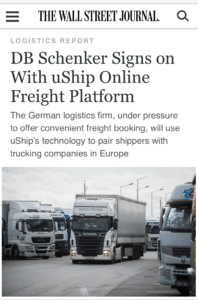by Erica E. Phillips, Wall Street Journal / The German logistics firm, under pressure to offer convenient freight booking, will use uShip’s technology to pair shippers with trucking companies in Europe /
DB Schenker, one of the world’s largest logistics firms, has hired uShip Inc. to connect shippers with trucking companies online, in the latest major tie-up between traditional freight brokers and technology firms.
The logistics unit of Deutsche Bahn AG, which coordinates shipments via air, rail ship and truck for retailers and manufacturers, said it’s paying “tens of millions of dollars” for exclusive rights in Europe to a digital freight-booking platform developed by Austin-based uShip.
Logistics companies worldwide have been racing to develop technology to make it easier for shippers to book freight transportation, much of which is still hashed out between brokers and carriers by phone or fax.
Companies like XPO Logistics Inc. are spending millions of dollars to develop in-house platforms. Others have pursued acquisitions, including United Parcel Service Inc., which last year bought Coyote Logistics, a freight technology firm, for $1.8 billion. Deutsche Post AG took a €345 million ($383 million) write-off on a failed effort to create its own global freight forwarding technology platform.
Large freight operators like DB Schenker, which depend on big industrial shippers that move goods in containers and on pallets, generally have lagged behind technology developments in the retail world that have sought to link consumers more seamlessly to shipping. The rapid growth of e-commerce has fractured many retail supply chains, however, and pushed traditional freight companies to handle shipments in smaller quantities and more rapidly as their customers scramble to meet consumer demands.
DB Schenker, the third-biggest third-party logistics firm with $17 billion in revenue last year, was developing an online booking platform internally, but opted to partner with uShip so the company could offer some of those services immediately, said Nick Parker, uShip’s chief technology officer.
Analysts say logistics operators that don’t offer fast, cheap transportation booking increasingly risk losing business to rivals that can.
“It’s a fundamental ‘make vs. buy’ strategy,” said Greg Aimi, a logistics industry analyst with Gartner Inc. Partnering with a technology firm, rather than trying to develop the digital capability internally, “could be a faster way to market, a faster way to that capability to propel yourself forward.”
For uShip, which reported $160 million in revenue last year, signing such a large client provides a leg up over an increasingly crowded field.
The company was founded in 2003 and launched its online marketplace in 2004, making it one of the first brokers of its kind. But numerous startups have entered the fray in recent years, some with backing from Silicon Valley investors. All are competing for the small slice of the freight market not handled by conventional logistics operators.
“By partnering with a 3PL [third-party logistics company], uShip is expanding its reach even further,” said Cathy Roberson, a logistics industry analyst.
Ms. Roberson said the industry is likely to see more tie-ups between freight marketplace technology companies and 3PLs.
“There’s got to be consolidation in that market and I think 3PLs are going to start snatching them up,” she said.
DB Schenker will use uShip’s PRO application in its European trucking unit, according to a press release. Through the application, trucking companies can offer competitive quotes for shippers, and allows customer sto book and track their shipments on mobile devices.
“The relationship is them teeing up problems for us to solve and us solving them,” Mr. Parker said.
View the original article


